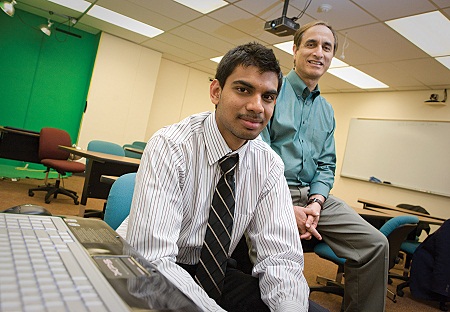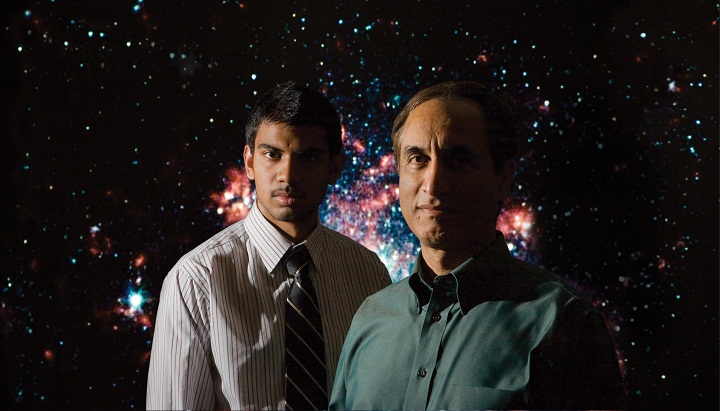Thinking Outside the Xbox
Thursday, January 27, 2011

“The best way to teach a subject is to teach it indirectly,” says Kak. “You can grab the students’ attention indirectly while you have them do something else they enjoy.”
Kak uses this approach in a quest to make a complex academic discipline more understandable and attractive to students.
So just what is attractive to today’s student? That’s a no-brainer.
Kak and his team recently introduced Video Game Design, an upperclassman elective so popular in its first semester that enrollment maxed out with 22 students. After all, students now could play BioShock, Halo 3 and Fallout 3 on Xbox without fear of reprimand.
Along the way, the students started to grasp computer science theories while developing entertaining video games.
Kak’s philosophy was working.
Taking Games Seriously
The Ivory Tower has been slow in responding to the video-game industry. Many academics believe video games may shorten attention spans, distract in the classroom or prove to be a passing fad.
Kak thinks differently.
Computer science enrollments, which began dropping after the dot-com bust in the 1990s, have been dismal in the past decade, Kak says.
While others blamed the decline on the fears of outsourcing to programmers overseas, Kak firmly believes most technology companies want work done in the U.S. “In recent years, there is a perception that a lot of computer-science jobs are leaving the U.S. That’s not true,” he says. “The U.S. is number one in all creative endeavors.”
To win back students, Kak and his colleagues decided to avoid the pointy-headed scholar approach and try the geek-chic attraction of a hardcore gamer.
Kak agrees that late night “cram sessions” with an Xbox will not necessarily lead a student to a degree. “However, when we ask our students to design some very simple computer games, we discover that the process teaches the students more subtle computer-science concepts,” he says. “Our main goal is to get students to think.”
Computer science junior Parth Dalal is a good example.
In 2009, the 22-year-old’s paper appeared in an issue of International Journal of Social and Humanistic Computing. His paper, titled “Rapid Digital Game Creation for broadening participation in computing and fostering crucial thinking skills,” garnered media coverage from publications including The Oklahoman.
The concept of Rapid Digital Game Creation — RDGC — is unique to OSU. Dalal’s theory suggests that using innovative teaching methods may bridge the digital divide between people with computer skills and those without.
The concept served as a catalyst for OSU researchers who are in the beginning stages of exploring how creating computer games can foster critical thinking skills.
Parth’s father, Nik Dalal, a management science and information systems professor in the OSU Spears School of Business, leads the team along with Kak and Pasha Antonenko, an assistant professor in education technology.
Parth Dalal and graduate students Praveen Kuruvada in computer science and Daniel Asamoah in MSIS complete the team.
They agree the digital divide is troubling and hope RDGC will sidestep the need for students to have any prior knowledge of computer programming.
Seeking Philosophical Gamers
The work is just beginning with surveys showing positive outcomes.
Participants use off-the-shelf tools like GameMaker that provides a tutorial to build video games quickly. Students learn about storytelling, character development, plot evaluation and how to work with digital images and music.
Thus far, research suggests that using GameMaker is helpful in introducing programming concepts. For example, while creating a game, students learn about properties such as object-oriented programming, known as OOP.
Simply put, OOP is used to design applications and computer programs. It’s how humans talk with computers.
The OSU researchers want more than just game builders, however. They want deep thinkers.
“As teachers, we find it problematic that students do things because they are comfortable doing them,” says Kak. “It is difficult to get out of the box they are used to.”
So the researchers examine thinking skills. “Critical thinking is the capacity to create distance between you and the problem and then look at the problem from various perspectives,” Kak says. “It can help you find a solution if a problem is posed in a creative perspective.
“I firmly believe creativity is the ability to get out of that box and that comfortable space.”
Professor Dalal’s role is to examine the relationship between learning and wisdom, and Antonenko takes the findings and develops assessment tools based on education theory. Kak’s role on the research team is to study the type of computer games that may be created to lead students to different types of skills.
For example, games may help military veterans cope with post-traumatic stress disorder or may assist biology students in grasping the inner workings of the immune system. Kak also hopes the research will lead to games that help older people keep up their cognitive skills. “There’s an entire spectrum of possibilities,” he says, “and a whole new world out there for us in the academic community to analyze and study.”
As for Kak, was he ever that kid in the basement playing video games?
His two kids play video games, but, no, video games were never part of his generation growing up in Srinagar, Kashmir, in India.
Then again, there was that game in the 1990s.
“Let me confess, many years ago I was obsessed with a game called Tetris. I wanted to beat the machine.”

